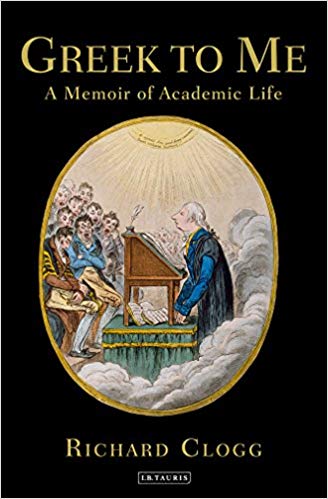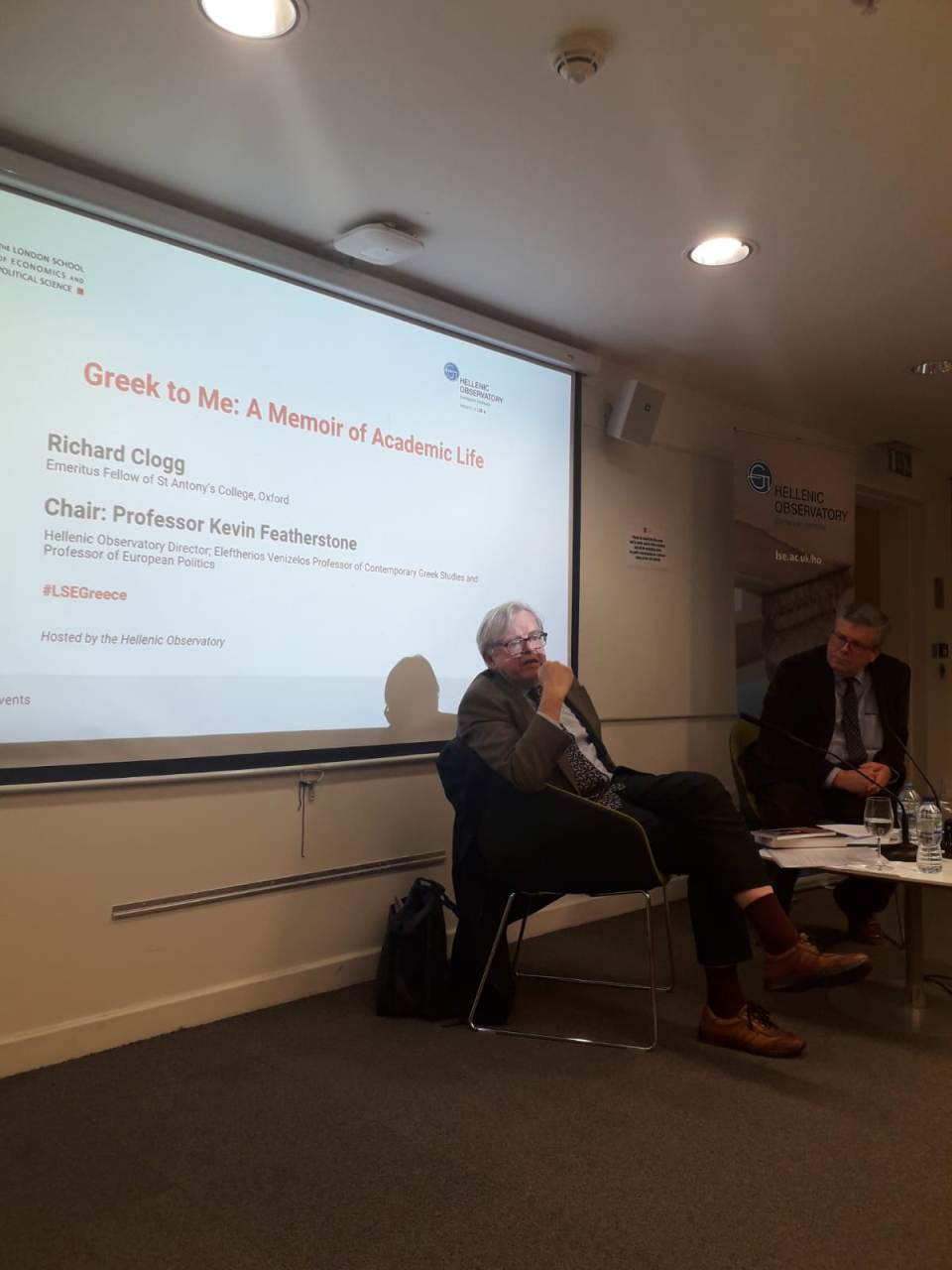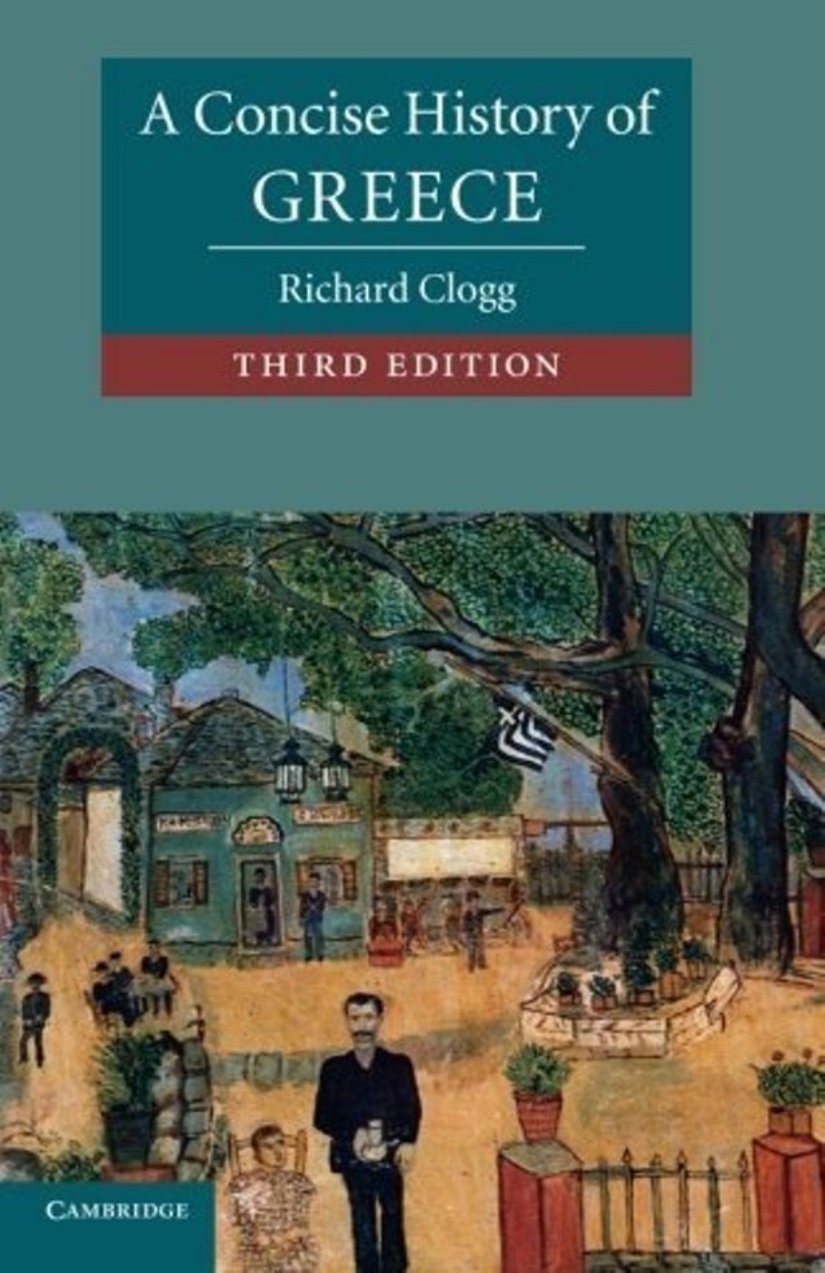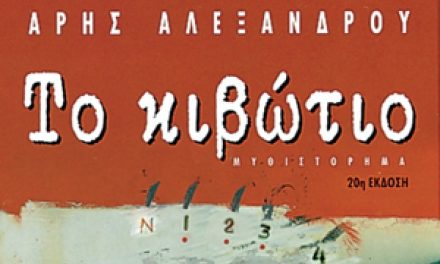Richard Clogg, Emeritus Fellow of St Antony’s College, Oxford, is one of the most widely read British academics writing about Modern Greek history. He was previously Professor of Modern Balkan History in the University of London. He has written widely on the modern history of Greece and also on Greek politics. His Concise History of Greece (Third edition Cambridge 2013) has been translated into thirteen languages, including all the languages of the Balkans. His most recent publication is Greek to Me: a Memoir of Academic Life (I.B. Tauris 2018).
In an interview with @GreeceInUk* Richard Clogg talks about his travels and research in Greece and his decision to study the country’s “fascinating modern history”. He is struck by the ignorance of Greece’s contemporary history in the UK, noting that “the focus on ancient Greece, both in Greece itself and in the world in general, has sometimes been at the expense of understanding the rich, and at times tragic, history of the Greeks in modern times”. Moreover, he talks about the “bitterly fought civil war” (1946 to 1949) and the military junta (1967 to 1974) and calls for further research on the important role that the BBC Greek service played in the anti-Colonels’ campaign.
Coming to modern times, Clogg argues that the debt crisis that struck Greece has inflicted hardship on much of the Greek population, but reminds us that “Greece did prove to be able to recover from two earlier crises in the twentieth century.” He highlights the benefits from being part of the EU and welcomes the fact that “unlike the UK, there is no serious movement in Greece to leave the EU”. Speaking about the Balkans, he notes that “the Prespes agreement holds out the prospect of a peaceful settlement to a long-running conflict.”
In the first chapter of your book “Greek to me: A Memoir of Academic Life”, writing about your first encounter with Greece, you mention that “the beauty of Greece had been breathtaking and its inhabitants extraordinarily friendly and hospitable, and I decided that I wanted to learn more about the country”. Ηow did your studies of Greece affect you as a person and an academic?
I first visited Greece on leaving school in 1958, when foreign tourists were something of a rarity. There were two hundred and fifty thousand visitors in that year. In 2018, over thirty million tourists visited the country. I have always been glad that I chose to study the fascinating modern history of Greece. For many years I taught at the School of Slavonic and East European Studies where I was virtually the only person studying a country that was part of the ‘free’ world and a visit to Greece to carry out research was a positive pleasure compared to the grim conditions existing in many Soviet bloc countries.
 Whereas in Britain there is a long tradition of studying ancient Greece and much admiration about Greece’s classical past, there seems to be little knowledge about modern Greek history. How could interest in modern Greek history and culture be invigorated?
Whereas in Britain there is a long tradition of studying ancient Greece and much admiration about Greece’s classical past, there seems to be little knowledge about modern Greek history. How could interest in modern Greek history and culture be invigorated?
I am continually struck by the ignorance of the recent history of Greece that exists in the UK. A case in point was when David Cameron paid his first visit to the US after becoming leader of the Conservative party in 2005. He gave an interview on American television in which he spoke of the Americans fighting alongside Britain against the Nazis at the time of the blitz. The blitz began in September 1940, whereas the US did not enter World War II until December 1941. The reality is that Britain’s only active European ally in the desperate years 1940 and 1941 was Greece. I sought to correct this error in a letter to The Guardian.
You have done extensive research on the role of the Special Operations Executive (SOE), in giving aid and encouragement to the Greek resistance movement during World War II. How would you evaluate SOE’s contribution to the Greek resistance?
The Special Operations Executive was very active in Greece during the German, Italian and Bulgarian occupation. It achieved some spectacular acts of sabotage, but most of these required collaboration with the Greek resistance. It is a pity that most people’s knowledge in the UK of the resistance in Greece is limited to the famous kidnapping of General Kreipe in Crete in 1944, about which a film was made. This operation was carried out with great skill and bravery, but it served little military purpose and resulted in fearful reprisals. It is a pity that some of the other operations of SOE and its Greek collaborators are not better known.
During the junta (1967-1974), Britain seems to have been -to a certain extent- an ideological battlefield between apologists for the Colonels and campaigners against this “brutal, anachronistic and absurd” regime, as you describe it in your book. At that time you were a frequent broadcaster for the BBC Greek Service. What role did the BBC play in the anti-Colonels’ campaign?
The BBC Greek Service, together with the German Deutsche Welle, played an important role in sustaining the morale of the many opponents of the junta in Greece by providing balanced and accurate coverage of Greek affairs during the Colonels’ dictatorship. I was pleased to play some part in this coverage. The Greek Service encountered problems with the Foreign Office, which at that time had responsibility for financial support of the service. The Foreign Office’s policy was to retain what it termed ‘a good working relationship’ with the junta. This from time to time caused problems between the two organisations.
It occurs to me that a good book could be written about the history of the Greek Service. In the late 1960s and 1970s there were some individuals still alive who could have been interviewed about the Greek Service during the war, a time when the Greek Service employed the call sign of goat bells that had been used by Athens Radio in peacetime. But there is still a good amount of archival material available. Moreover, many of those who were working for the Greek Service during the seven-year dictatorship of the Colonels are still around to be interviewed.

Richard Clogg with Professor Kevin Featherstone at the launch of Greek to Me: a Memoir of Academic Life. The event was hosted by the LSE Hellenic Observatory in December 2018.
You often refer to the passions aroused by civil war in Greece many decades after its end in 1949. How far does the civil war legacy still affect Greek politics and society? Also, to what extent can the political use of history be avoided?
It was inevitable that the bitterly fought civil war between 1946 to 1949 should have cast a long shadow over Greece even after the end of hostilities. The Colonels’ dictatorship that misruled Greece between 1967 and 1974 can be seen, in some sense, as an attempt to stop the trend towards the liberalisation of politics and society that by that time was under way. But one consequence of the dictatorship’s downfall was the legalisation of the Communist Party of Greece, which was an indication of how much the political climate had changed in the country. It is important always to bear in mind the saying that history tends to be written by the victors.
You seem to adopt a critical stance towards the “progonoplexia” (ancestor fixation) and the “arkhaiolatreia” (excessive, obsessive reverence for antiquity). In a similar vein, you denounce the belief that there is an unbroken continuity between ancient and present-day Greeks, which expands well beyond the linguistic continuity to include race and culture. How has this belief affected Greece’s history and to what extent is it still alive and relevant today?
Given the extraordinarily rich heritage of ancient Greece, it is understandable that some Greeks are given to progonoplexia, which has been translated as ancestoritis. But the focus on ancient Greece both in Greece itself and in the world in general, has sometimes been at the expense of understanding the rich, and at times tragic, history of the Greeks in modern times. I try to avoid using terms such as Modern Greece and Modern Greeks. I prefer to use the terms Greece, Byzantine Greece and ancient Greece. I call my short history of Greece in modern times A Concise History of Greece, although it begins in circa 1770. An Oxford colleague John Boardman has written a book with the title The Greeks Overseas. One might expect such a book to be devoted to the world-wide Greek diaspora in modern times. It is, in fact, a study of Magna Graecia, the Greek colonies in antiquity
In your book you refer to the controversy over the Macedonian issue. To what extent is this controversy related to the troubled history of the Balkans? In your opinion, how could the Prespes agreement affect the future of the region?
The Balkans have in modern times been a source of conflict. In the 1990s, following the disintegration of Yugoslavia, the region again erupted in violence. The Prespes agreement holds out the prospect of a peaceful settlement to a long-running conflict. Relations between the USA and Mexico are currently poor. The existence of a US state called New Mexico, however, is not the reason for this.
 Greece is recovering from an 8-year crisis which has had major effects on its political system and society. In the latest edition of your book “A Concise History of Greece”, updated in 2013, you expected the road to recovery to be “long, arduous and painful” but remained hopeful that “on past precedent” recovery could be achieved. Which historical precedents account for this optimism?
Greece is recovering from an 8-year crisis which has had major effects on its political system and society. In the latest edition of your book “A Concise History of Greece”, updated in 2013, you expected the road to recovery to be “long, arduous and painful” but remained hopeful that “on past precedent” recovery could be achieved. Which historical precedents account for this optimism?
The current crisis in Greece has inflicted hardship on much of the Greek population. But Greece did prove to be able to recover from two earlier crises in the twentieth century. The first was the catastrophic defeat in Asia minor in the early 1920s, which led to the exchange of populations between Greece and Turkey and the influx of over a million refugees into a country with an existing population of five and a half million. This caused considerable strain, but the resettlement of the refugees was a remarkable achievement. In fewer than twenty years, however, Greece was to experience a barbarous occupation by Germany, Italy and Bulgaria. This was accompanied by one of the most serious famines to occur in Europe in modern times. Alongside this was one of the most serious inflationary outbreaks ever recorded. Moreover, when the occupation ended, Greece experienced a bitterly fought civil war. But, despite the disasters of the decade of the 1940s, Greece in the forty years after the end of the civil war experienced a remarkable recovery, and went from being a poor country to a relatively rich one. In comparison with her Balkan neighbours during the same period, Greece was a marked success.
You have studied not only the history of Greeks who lived within the borders of the Greek state, but also the history of the large Greek diaspora. What is the contribution of Greece’s diaspora to the development of modern Greece? How could the ‘new diaspora’ – the large number of young Greeks who left Greece during the crisis of the last decade – contribute to Greece’s recovery?
Greece is a classic diaspora nation. Rather like Scotland in the 19th century, poverty gave a powerful impetus to emigration, which, is reflected in the sizeable diaspora populations in the USA, Australia and elsewhere. One of the great successes of the diaspora was that the Greek-Americans were able to mobilise and exert pressure to get the British government to partially relax its economic blockade at the time of the famine, enabling food to be imported. Sadly, one of the consequences of the recent crisis is a further migratory wave, which has led to significant numbers of young Greeks once again taking the path of emigration. Whether those making up this ‘new diaspora’ will in time return remains to be seen.
Greece’s historically close relations with Britain entered a new phase when Greece joined the EU in 1981. What has Greece gained from its EU membership?
Greece has certainly benefitted from membership of the EU, which, above all, has succeeded in keeping the peace in a continent devastated in two world wars during the twentieth century. It is noteworthy that, unlike the UK, there is no serious movement in Greece to leave the EU. In the current climate of instability in the world, Greeks have had the sense to realise that membership of such a union affords a degree of stability and protection which they would not have if their country were not a member of the EU.
You retired from St Antony’s College at Oxford in 2005, but you remain active in your field. What are you currently involved in and what are your plans for the future?
It’s an old cliché that a person is often never busier than in retirement. One of the advantages of academic life is that one can carry on working, writing and researching, if one wants to. I am currently working on what will very likely be my last book. This will examine the role of the Special Operations in Greece during the occupation, a project on which I have been working for many years.
* Interview by Nancy Andriopoulou, Press Secretary at the Press Office of the Embassy of Greece in London.











